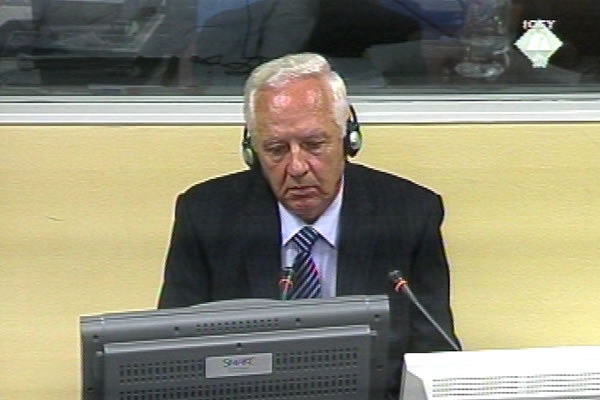Home
BOSNIAN SERB ‘NEW DEMOGRAPHIC POLICY’
In his evidence in Ratko Mladic’s defense, Radovan Glogovac, former member of the Exchange Commission, claimed that the Bosnian Serb leadership’s policy was designed to help Serb refugees on the one hand, and on the other hand to help those non-Serbs who wished to leave. The prosecutor told him the non-Serb civilians were exchanged for soldiers, and Serb refugees were settled in the areas that Muslims and Croats had left
 Radovan Glogovac, defence witness at Rako Mladic trial
Radovan Glogovac, defence witness at Rako Mladic trial Former official of the Serbian Democratic Party from Zenica Radovan Glogovac said in his statement to Ratko Mladic’s defense that the Serbs from the Zenica municipality were abused, killed and detained during the war. At the same time, Glogovac explained, Serbs were also prohibited from leaving the area in order to ‘paint a picture of multi-ethnicity at all costs’. Serbs did leave after all, and as a result, Glogovac said, most of the 22,000 Serbs who had lived in Zenica before the war were now gone.
The witness left Zenica in June 1992 and found a job in the Republika Srpska government. At the beginning of 1993 Glogovac became an advisor to Velibor Ostojic, minister without a portfolio, and a member of the Exchange Commission. According to Glogovac, in this capacity he tried to help the non-Serbs in Republika Srpska to move to other parts of BH. He only did that when they made specific requests to do so.
Glogovac dismissed the suggestion made by prosecutor Traldi that the Serb side exchanged civilians for soldiers. This prompted Traldi in the cross-examination to show the witness a report from the Mrkonjic Grad State Security Service about an exchange in July 1994. According to the report, the BH Army handed over eight soldiers to the Bosnian Serb Army in exchange for ten BH Army fighters and about 200 civilians, in the presence of various witnesses. Glogovac explained that on that occasion soldiers were exchanged for soldiers, and civilians ‘left voluntarily’. Their departure had nothing to do with the exchange. According to Glogovac, the report drafted by the Serb intelligence was ‘irresponsible’.
The prosecutorshowed an order of General Zdravko Tolimir issued in October 1994, where Tolimir asks that the Republika Srpska authorities exchange non-Serb civilians for Serb soldiers. The next document was a report of the Bosnian Exchange Commission showing that the exchange did indeed take place: on 15 October 1994, Serb soldiers were exchanged for Muslim prisoners, who included soldiers, but also women, children and the elderly. Glogovac claimed he knew nothing of such occurrences; as for himself, he never did anything of the sort.
The prosecutor showed several war-time speeches made by Minister Ostojic in the Assembly, when he advocated the settling of Serb refugees into ‘sensitive areas’ such as the Drina basin, Posavina and the Sana-Una region. The goal was to establish a ‘geographic continuity’ of the Serb nation as part of the ‘new demographic policy’. The witness said that in his view, it was impossible to accomplish this goal because those areas were mostly ravaged by war and could not be used to settle people.
Like many of the previous witnesses, Glogovac claimed that the Croats and Muslims were the first to prepare for the war. Serbs had to respond to their efforts by ‘organizing themselves’. This prompted the prosecutor to confront the witness with two documents showing the opposite was the case. In the first document, the minutes from an Assembly session, Jovan Tintor, a SDS official, describes how as early as in 1991 he established military units ‘on the president’s order’. Glogovac dismissed the claim, adding that it was ‘personal aggrandizement’ by a man prone to ‘tongue-flapping’.
The other document was a report from the JNA 2nd Military District from March 1992, which states that 1,700 weapons were distributed to Serbs in Zenica. The witness dismissed the allegation as highly unlikely.
Ratko Mladic’s defense case continues on Monday.
Linked Reports
- Case : Mladic
- 2014-09-02 PROBATIVE VALUE OF DEFENSE EVIDENCE – ‘ZERO’
- 2014-09-01 EVIDENCE ON DEPLYOMENT OF BH ARMY TROOPS IN SARAJEVO
- 2014-08-28 NO POINTS FOR PRESENTATION
- 2014-09-08 HOW TO RAZE ‘HALF OF SARAJEVO’ TO GROUND WITH ‘EMPTY GUN’
- 2014-09-09 PRIME MINISTER KNEW NOTHING ABOUT RAPE
- 2014-09-10 WITNESS REFUTES ‘BAD SERBS’ THEORY
